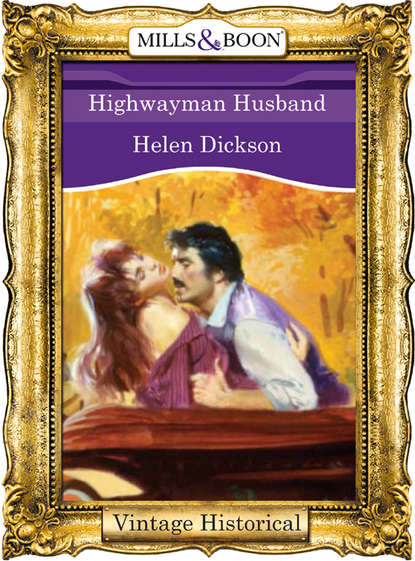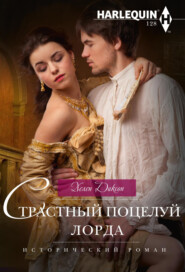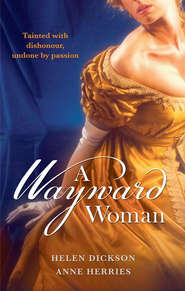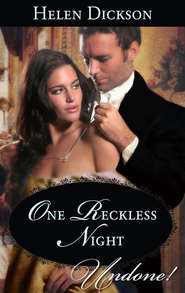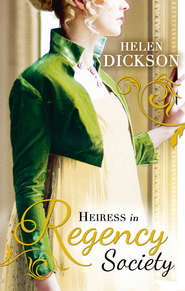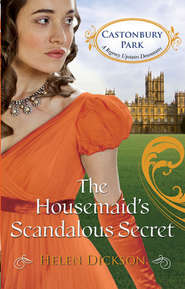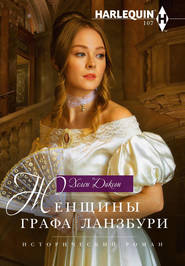По всем вопросам обращайтесь на: info@litportal.ru
(©) 2003-2025.
✖
Highwayman Husband
Настройки чтения
Размер шрифта
Высота строк
Поля
‘We have known each other almost two years,’ he responded sharply, irritated by her resistance. ‘Time enough to get to know one another, I would think.’ He gave her a studied, half-lidded look. ‘There isn’t anyone else, is there, Laura?’
‘You know there isn’t. But you—you do care for me, don’t you, Edward?’ she asked tentatively, wanting reassurance.
‘Of course I do—I’m not in love with anyone else. I do believe we have it in our power to make each other happy. Besides, it’s time you thought of your future and realised that you can’t go on as you are—and stopped rattling around in that great, draughty old house.’
Laura bristled, resenting his remark. ‘Edward, it is my home you are speaking of.’
‘Not for much longer. You will have no need of Roslyn Manor when you are married to me—which is good enough reason to avoid delaying the ceremony. You have done an admirable job running it for the past two years, but you will have to relinquish control when we are married and turn it over to your husband. I’m not sure what I’ll do with such a rambling old place, but I’m sure I’ll think of something,’ he retorted harshly.
‘Roslyn Manor is a beautiful house,’ Laura remarked, coming quickly to the defence of the house she had grown to love in the two years she had lived there, and she was deeply concerned about what Edward would do with it and the servants when they were married. It was a matter that still had to be discussed between them and both their lawyers. ‘I shall miss not living there.’
‘I am certain when the time comes you will be relieved to surrender the burden and apply yourself to running Burfield Hall instead.’
Laura averted her eyes and reined in her tongue to keep from saying something that would anger him—something she would regret. Her brother Philip, who lived in London with his wife Jane and two small children, had expressed his desire to see her settled and favoured the match with such an estimable gentleman. When he had brought Jane and the children to Roslyn Manor recently, he had pressed her to accept Edward’s suit—harshly telling her that if she wanted to drag herself through the years ahead as a soured widow that was up to her, but she would live to regret it. Always willing to consider her brother’s wishes, she had seen the reason behind his directive, and so she had accepted Edward’s proposal, although it was a decision she was already beginning to regret.
It was only in recent days that she had become aware of her late husband’s dislike of Edward, a close neighbour whose land ran adjacent to the Mawgans’, and the idea that she had consented to marry him made her uneasy. Suddenly her relationship with her betrothed seemed a mockery and a dishonour to her husband’s memory.
Having lived all her life in London, on finding herself a bewildered young widow in a strange place, with no friends or relatives close by she could turn to, at first she had been touched by Edward’s quiet solicitude and attention, but it was only after a decent period of mourning that she had allowed him to call on her.
No gossip had ever reached her ears about him—and she was not one to take much notice of it if it did, but on a recent visit to St Austell to do some shopping she had overheard him being discussed by total strangers and had lingered over the purchase of a pair of gloves while she listened. Since then the more she found out about the man she was committing the rest of her life to, the more she realised she didn’t know him at all.
He was the owner of two small tin mines in the district—one, Wheal Rose, still operating, and the other closed years ago. To settle debts, his late father had sold a large portion of his land to the Mawgans, land Edward would like to repossess—particularly one piece of land that swept down to Roslyn Cove, which was an ideal place for landing contraband from across the Channel.
Edward’s wealth had mysteriously increased over the last two years. On the occasions when he visited London he had begun to lead an exotic life, playing for only the highest stakes at the gaming tables, buying a fashionable house in Kensington, where he entertained on a lavish scale, and here in Cornwall his stables—as Laura had seen for herself—were filled with only the finest horses.
There was no accounting for his sudden affluence, which, because production was low, could have nothing to do with his mine, as many people up in London believed. Of late, she had heard it whispered that he was the leader of a well-organised smuggling ring—an illicit yet highly lucrative trade prevalent on the south coast.
At first she had discounted the truth of this, for no one seeing Edward Carlyle—a highly respected pillar of the community—would take him for a criminal, much less one hugely involved in bringing contraband from France or the Channel Islands and landing it in secluded creeks and coves on the Cornish coast. However, through the thought process by which Laura’s sensitive perceptions worked, taking everything into account, including Edward’s frequent trips across to France, despite the violent unrest in that country, she came to the conclusion that there might be some truth in these rumours.
Her sharp eyes had recently observed the comings and goings of men in the middle of the night, and the dark, sinister shapes of boats and men down in the cove, of wagons stacked high and packhorses weighted down with barrels and packages disappearing onto the moor before dawn. She could have confronted them and forbidden them to cross Mawgan land, but, fearing reprisals, she thought it prudent to do as everyone else seemed to do in Cornwall and turn a blind eye to the activities of the smugglers. To inform on them would mean certain death.
Having inherited her husband’s estate, it was only natural that Edward should want to marry her, but with these grave doubts about him now clouding her mind she was reluctant, which was why she played for time as the only ally in her favour.
‘I have to go away tomorrow morning,’ Edward announced in a more tolerant tone, although his features were set in an unsmiling expression as he regarded her. ‘I shall be gone one week, no more. It will give you ample time to think about our wedding. I would like you to be more decisive when I return.’
‘Yes, of course,’ Laura replied stiffly, averting her eyes once more.
Edward stared at her profile, tracing with his gaze the fine, classic contours of her face, the brush of her long ebony eyelashes on her cheeks, the hollow at the nape of her neck where a mass of blue-black curls came to rest. He had never seen the like of her, not in London nor in Cornwall. She was quite extraordinarily lovely, but it was not for these qualities that he wanted to marry her, it was more for who she was and what she would bring him when she became his wife.
His highly developed hunting instinct and quick grasp of opportunity were the reasons he had presented himself at Roslyn Manor shortly after her husband’s death, leaving her as sole beneficiary of his will, and she had been so engrossed in her grief and recent loss that she failed to notice how manipulative he was being. Reaching out, he took her hand once more. Lifting it, he placed it to his lips.
‘You will be mine very soon, Laura,’ he murmured in softer tones. ‘We both know it.’
Laura turned and looked at him once more, meeting his gaze. His eyes told her nothing—they were as clear and calm as they always were, but his grip on her hand was firm and held no promise of release. She struggled to free herself from the haunting darkness of the moor, and the closeness of the man next to her.
Leaving the desolation behind, the coach passed through a wooded area. The wind was strong enough to keep the trees in a constant stir, masking the sound of the coach wheels on the road. Laura shuddered. It was the sort of wild night that made one believe all manner of spirits and demons might be abroad.
However, it wasn’t a spirit that suddenly appeared on the side of the road—sprung out of the ground as if by magic—but two horsemen.
At the sudden appearance of these ghostly apparitions looming large and menacing, Amos trembled with fear and icy water trickled down his spine. They were both wearing redingotes, and their tricorn hats were pulled well down. The lower halves of their faces were covered by handkerchiefs. Amos’s terror was transmitted to the already frightened horses and they screamed and bolted, hurtling the coach along the rough road so the wheels were lifted clear of the ground.
Desperately Laura and Edward—who was savagely cursing and saying something about footpads while he fumbled at his waist for his pistol—clung to anything their fingers could hold as they were tossed about inside the coach. Conscious of the horsemen, flying hooves and the clatter of the wheels, Laura felt that she was in the power of demons. After what seemed like hours instead of minutes, the two horsemen managed to bring the maddened beasts to a skidding, shuddering halt.
‘Whoah! Whoah, now. Steady, now.’
The muffled words of someone trying to calm the horses came to Laura inside the coach. Peering gingerly out of the window, she saw one of the horsemen riding towards her. She stared transfixed at the apparition, his horse’s breath snorting out like a dragon’s in the cold night air. An icy shiver passed over her and an indescribable terror seized her when she saw a long-barrelled pistol pointing unwaveringly at her.
The men were highwaymen, that was obvious. Daring robberies by armed men took place frequently on the highways at night, and people were cautioned not to travel. Laura was beginning to regret refusing Edward’s suggestion that she wait until daylight to travel home.
The lamp on her side of the coach had gone out, and now it was so dark that the figure had no face. Her immediate instinct was to shrink back into the dark interior of the coach in a childish effort to shut out the threat of danger. But some power within her made her retain her calm and anger took hold of her, giving her courage.
‘Who are you?’ she cried. ‘What do you want? How dare you frighten the horses in this way? You could have killed us all.’
‘Please accept my humble apologies,’ the man said, his voice deep and without contrition, muffled in the folds of the handkerchief across his mouth. ‘I have a tremendous respect for horses. It was not my intention to cause them any distress.’ With a touch of his spurs he drove his mount to the side of the coach and leaned forward, peering inside. ‘Ah, just the two of you. Step down, if you please,’ he said with mock-courtesy.
The effect of this assault upon Edward—who was always calm and in complete control—was explosive. ‘Go to the devil, you thieving blackguard,’ he spluttered, roughly pulling Laura away from the window, while cursing his clumsiness, which had caused him to drop his pistol onto the floor of the carriage. If he tried to retrieve it he was in danger of being shot. ‘This is disgraceful! I am Sir Edward Carlyle and I have powerful influence in these parts. Allow us to go on our way or by God you will pay for this appalling outrage with your life.’
‘I know perfectly well who you are, and I would be obliged if you would heed my request,’ came the highwayman’s soft, ironic tones. ‘I’d as soon not blow your head off. I never show violence to those who comply.’
‘That won’t stop them hanging you when you’re caught,’ Laura retorted sharply.
The highwayman made a small sound that might have been laughter. ‘You’re right. Most highwaymen regard it as inevitable that they should end their days on the gallows, and I am no exception. But you have only yourselves to blame for the situation you are in. There are too many scallywags abroad at this hour for decent people to be crossing the moor after dark. Now, come along. Step down. You are wasting my time.’
With a pistol pointing at them, there was nothing for it but to comply. Reluctantly the two occupants of the coach stepped down onto the highway. The highwayman’s accomplice had dismounted and was guarding Amos, who had already clambered from his perch.
‘You are a conscienceless outlaw, who will be hanged for your thievery and violence against innocent travellers,’ Edward repeated, incensed, his expression so savage that he looked as if he was about to have an apoplexy.
‘That is so,’ the other agreed cordially. ‘But I have to be caught before I can be hanged.’
Backing his horse away, he dismounted. He was extremely tall, taller than Edward by a head, who was by no means short in stature, and when he moved it was with the lethal grace of a predator. His manner bore a threatening boldness. He held himself aloof, and yet with his mere presence he dominated the scene around him. He tipped his hat to Laura, and she almost expected him to click his heels in a mocking, courtly bow. With his free hand he drew a knife smoothly from its sheath secured to his belt, twisting it delicately.
The blood drained from Edward’s face, leaving him white in the shadowy light. He drew himself up straight and, squaring his shoulders, stepped back. ‘So—you intend to kill us.’
The highwayman nodded thoughtfully. ‘I might,’ he replied, watching in silent fascination as a blue light danced along the blade, seeming to bring the lethal weapon to life. Stepping forward, he pressed the blade hard under the angle of Edward’s jaw.
Laura gasped. ‘No,’ she cried, shocked almost beyond bearing.
Keeping his eyes fixed on Edward, the highwayman addressed her coldly. ‘This is no concern of yours, madam.’
‘Stay where you are,’ Edward rasped when Laura would have thrown herself at his attacker. ‘What do you want from me? I carry nothing of value.’
The highwayman stood there a moment longer, then, with a shrug of indifference, stepped back. ‘Come, now. You say you are a gentleman—although I suspect there are many who would dispute that,’ he mocked. ‘You must be carrying a wallet—and trinkets. A timepiece, perhaps, a cravat pin—rings—a snuff box. You must have something of value. Throw them on the ground, or it will be the worse for you.’
Edward glanced at the black muzzle aimed at his stomach, and slowly and reluctantly removed his diamond and ruby cravat pin and watch and threw them on the ground. They were followed by a rather splendid ring and a beautiful silver snuff box, a gift to him from Laura as a token of her affection on their betrothal.
The highwayman looked down at the objects and shifted them about with the toe of his boot, before saying slowly, ‘You’re right. You have nothing that interests me—only this.’ Without taking his eyes off Edward, he bent down and picked up the snuff box. Not bothering to examine it, he shoved it into his pocket.
‘You thieving scoundrel,’ Edward hissed, his hands bunched into fists at his sides. ‘I don’t know what game it is you are playing, but it’s most peculiar for a footpad. The timepiece is worth much more. I have nothing else of value.’





